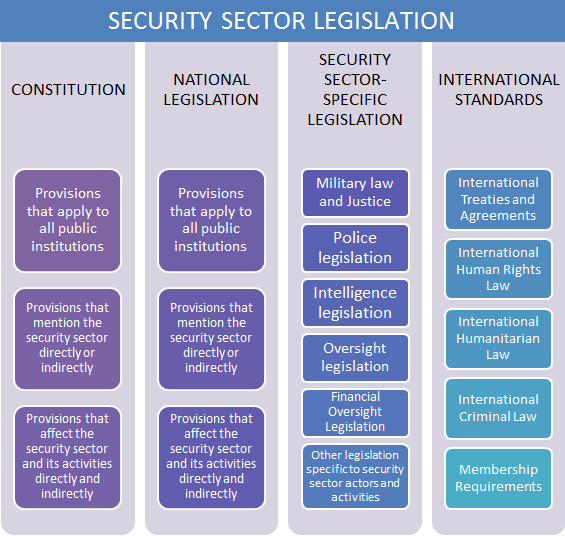The most fundamental legislation concerning the security sector is contained in a country’s constitution, accompanied by a body of general national laws and regulations that comprehensively mention the security sector in a direct, or indirect, manner and apply to all public institutions of the state. There is also a set of security-sector-specific laws and norms that acknowledge the special needs and characteristics of the security sector and its agencies. The sum of these national laws, rules and regulations constitute national security sector legislation.
Security sector legislation is not to be confused with military law. The latter refers to legislation exclusive to the military, usually related to upholding discipline in the armed forces, also referred to as military justice. Although, in some democratic countries, military law may apply to civilians, it must only to military personnel. Military law is, in fact, a part of security sector legislation along with laws on policing, security sector oversight, intelligence and intelligence oversight, financial oversight, and other security-sector-specific norms and regulations.
In a democratic governance setting it is the Parliament that establishes the legal basis for the armed forces, intelligence, security services, law enforcement and border security agencies. To that end, the Parliament can introduce legislation, amend existing laws, and scrutinize ministers and members of the security sector through enquiries, hearings, official document reviews, and expert advice.
Security sector legislation also includes international norms and standards dictated by international treaties and agreements. These standards can also be set as a precondition for membership such as those established by the European Union. There are also regional legal instruments that set out certain standards and obligations for the security sector. Fundamental international legal standards such as International Human Rights Law, International Humanitarian Law and International Criminal Law apply to the security sector, as well.
Security sector legislation is diverse and complex. Each country has a specific set of laws and norms regarding its security sector and its many agencies and activities. Since there is no ideal model of security sector legislation, the task of legislating for the security sector is a difficult one. However, creating legislation that respects democratic governance principles, ensures the rule of law and protects human rights is absolutely vital in order for the security sector to be effective and efficient. To that end, it is important to observe International Standards and Best Practices when drafting National Security Sector Legislation.
Key source:
DCAF, Legislating for the Security Sector
Resources:
Council of Europe Commissioner for Human Rights (2015), Issue Paper on Democratic and Effective Oversight of National Security Services.
DCAF (2011), Legislating for the Security Sector Toolkit: Understanding Military Justice.
DCAF (2011), Legislating for the Security Sector Toolkit: Principles Governing the Administration of Justice through Military Tribunals.
DCAF (2015), Financial Oversight of the Security Sector a Toolkit for Trainers.
DCAF, NATO (2015), Oversight and Guidance: Parliaments and Security Sector Governance.
DCAF (2011), Legislating for the Security Sector Toolkit: The South African Military Discipline Supplementary Measures Act.
DCAF (2011), Legislating for the Security Sector Toolkit: The Colombian Military Criminal Code.
DCAF (2015), Training Manual on Police Integrity.
DCAF (2012), Toolkit on Police Integrity.
DCAF (2011), Legislating for the Security Sector Toolkit: The European Code of Police Ethics.
DCAF (2011), Legislating for the Security Sector Toolkit: 10 Basic Human Rights Standards for Law Enforcement Officials.
DCAF (2011), Legislating for the Security Sector Toolkit: Police Legislation Model: The Swedish Police Act.
DCAF (2011), Legislating for the Security Sector Toolkit: Police Legislation Model: Republic of South Africa Police Service Act 68, 1995.
DCAF (2009), Legislating for the Security Sector Toolkit: International Police Standards Guidebook on Democratic Policing.
OHCHR (1997), International Human Rights Standards for Law Enforcement: A Pocket Book on Human Rights for the Police.
DCAF (2015), Legislating for the Security Sector Toolkit: International Standards for Financial Oversight in the Security Sector.
Hans Born, Adrian Wills (2012) Overseeing the Intelligence Services. A Toolkit.
DCAF (2011), Legislating for the Security Sector Toolkit: Understanding Intelligence Oversight.
DCAF (2011), Legislating for the Security Sector Toolkit: Compilation of Good Practices for Intelligence Agencies and their Oversight.
DCAF (2011), Legislating for the Security Sector Toolkit: The Canadian Security Intelligence Service Act.
DCAF (2011), Legislating for the Security Sector Toolkit: The Netherlands Intelligence and Security Services Act.
DCAF (2011), Legislating for the Security Sector Toolkit: The Argentinian National Intelligence Law.
DCAF, UNDP (2008), Public Oversight of the Security Sector. A Handbook for Civil Society Organisations.
Hans Born, Ian Leigh, (2005) Making Intelligence Accountable: Legal Standards and Best Practice for Oversight of Intelligence Agencies.
Hans Born (2015), Parliamentary Oversight of the Security Sector.




